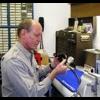
Equipment Maintenance
#1

Posted 30 January 2005 - 12:15 PM
#2

Posted 30 January 2005 - 01:43 PM
Of course said cert won't allow you to buy parts officially except through a shop (while working there), so its of little use.
If you're looking to do this independantly as a business, without a shop affiliation, its very difficult, as most manufacturers control the "official" flow of parts. This, by the way, is questionable in terms of its legality (read the Magnuson-Moss act sometime) but until someone sues over it, there you have it. It will also be difficult to impossible to get business liability insurance without the "shop parts" around your operation.
BTW, despite the claims that regulators are "complicated", they simply are not. Nor are they uncommon. You almost undoubtably have several around you house and don't realize it. Your BBQ has one on it, if you have natural gas in your home there's one on the meter, etc.
I have a long-standing offer (which has been taken up upon a couple of times) that anyone who cares to come by my place with a couple of beers can do so and I'll strip, clean and rebuild a reg in front of you. After seeing me do it once it'll disabuse you of the idea that there's anything complicated about them - there isn't. Cleanliness is important, and so is the schematic for some (so you put the parts back in the right order), and most regs have at least one 'special' tool you need to get things apart and back together properly, but in terms of difficulty it simply isn't.
The special tools, by the way, can be bought by anyone from Peterbuilt (http://www.scubatools.com); all you need to buy from them is a credit card.
More than you'll ever get in one of the DEMA "official" classes can be found in http://www.airspeedp...newregbook.html - its $50, but worth it for the schematics and parts lists, along with the theory on how they all work.
#3

Posted 30 January 2005 - 04:14 PM
Even learning how to properly repair one model does not expose you to all the little tricks and techniques that help you to do a complete and proper repair job on another model.
You can read books on the subject which will help but by the time the ink has dried the material is dated. You can start off with an equipment specialty to learn some basic concepts, however shy of finding that aforementioned mentor, working as an apprentice in a dive shop may be the only way to keep up with the ever changing refinements coming from the regulator manufacturers. It is a full time learning process and you can't just 'learn it' and then feel that you are completely qualified. For example I'm frustrated by most seminars that only capture the current annual changes and not the previous years and years of changes that have occured since the inception of that regulator. With so much turnover and attrition in the industry, it becomes very frustrating to keep abreast of all these vital changes which are extremely important if you intend to repair these regs.
Repeatedly I've had factory techs at the seminars tell me that the very small handful of us with the most experience should be taking all the future technicians under wing and teaching them ourselves. So far no factory has offered to pay me to do that and I'm busy full time repairing regulators right now.
Now for a bit of good news...Pete Wolfinger of Peterbilt incorporated has written an excellent treatice on understanding regulators. Anything that Pete has ever written is worth reading. He is one of the most knowledgeable individuals on the planet relative to regulator theory and repair. He can be reached via www.ScubaTools.com as mentioned in an earlier post. Pete is the manufacturer of most of the factory unique tools for specific regulator models for many different brands.
Good luck in your endeavors -Senior Tech
#4

Posted 20 May 2005 - 01:16 PM
AF Dive Equipment Repair
#5

Posted 20 May 2005 - 03:20 PM
#6

Posted 22 May 2005 - 02:24 AM
My BBQ runs on charcoal and no natural gas in my last condo, all electric there ;-).Officially? You get a ticket to DEMA and sit in a couple of hour-long "sermons" from manufacturers. Congratulations - you're certified as a reg tech!

Of course said cert won't allow you to buy parts officially except through a shop (while working there), so its of little use.
If you're looking to do this independantly as a business, without a shop affiliation, its very difficult, as most manufacturers control the "official" flow of parts. This, by the way, is questionable in terms of its legality (read the Magnuson-Moss act sometime) but until someone sues over it, there you have it. It will also be difficult to impossible to get business liability insurance without the "shop parts" around your operation.
BTW, despite the claims that regulators are "complicated", they simply are not. Nor are they uncommon. You almost undoubtably have several around you house and don't realize it. Your BBQ has one on it, if you have natural gas in your home there's one on the meter, etc.
I have a long-standing offer (which has been taken up upon a couple of times) that anyone who cares to come by my place with a couple of beers can do so and I'll strip, clean and rebuild a reg in front of you. After seeing me do it once it'll disabuse you of the idea that there's anything complicated about them - there isn't. Cleanliness is important, and so is the schematic for some (so you put the parts back in the right order), and most regs have at least one 'special' tool you need to get things apart and back together properly, but in terms of difficulty it simply isn't.
The special tools, by the way, can be bought by anyone from Peterbuilt (http://www.scubatools.com); all you need to buy from them is a credit card.
More than you'll ever get in one of the DEMA "official" classes can be found in http://www.airspeedp...newregbook.html - its $50, but worth it for the schematics and parts lists, along with the theory on how they all work.
#7

Posted 22 May 2005 - 06:04 AM
http://www.psicylinders.com
There are classes at shows besides DEMA that are open to the public. This year at Beneath the Seas I took the PSI course and a course from DUI on drysuit repair. I don't think I could do much more than change seals after that class, but I learned a tremendous amount about drysuits.
My sense is if you are interested in gear in general, there are opportunities if you look for them, but there are enough tools, etc. involved that it does not make sense to buy all the tools involved if you are just interested in learning for its own sake.
If you want to start an independent business you need to focus on something, just as a couple of the posters here have focused on regulators. For instance, I learned enough about drysuits to realize that you need really heavy duty sewing machines to do anything serious. If I were thinking of starting a business, would I purchase all the specialty regulator tools and a heavy sewing machine and all the tools and parts to handle anything else? Time to chose a specialty.
1 user(s) are reading this topic
0 members, 1 guests, 0 anonymous users















